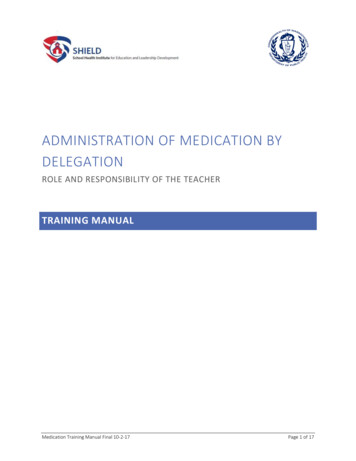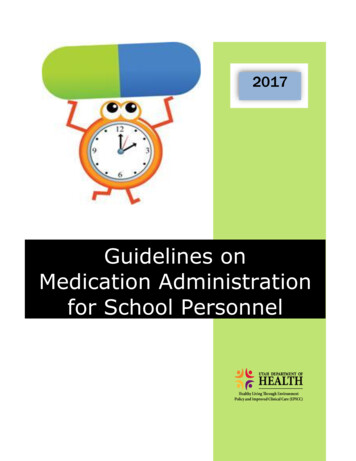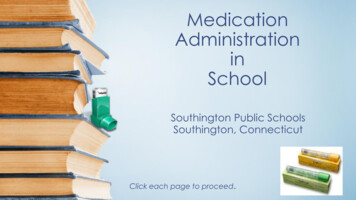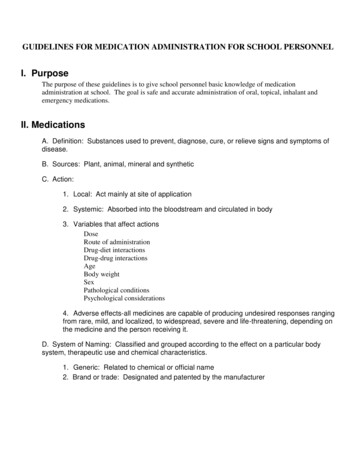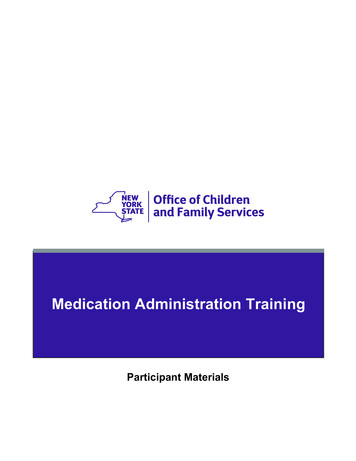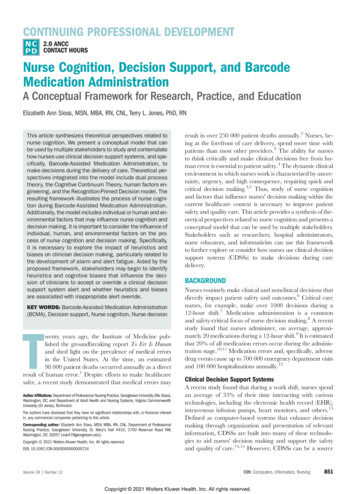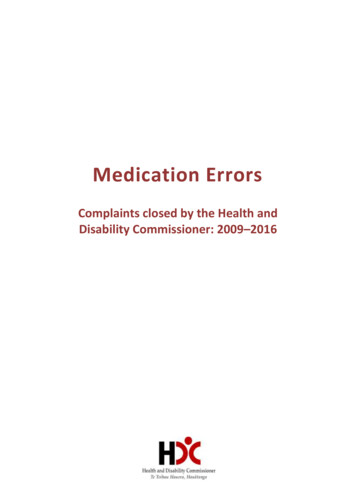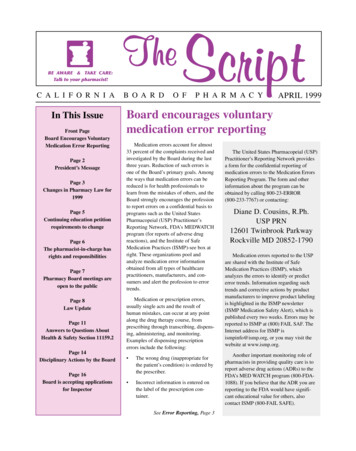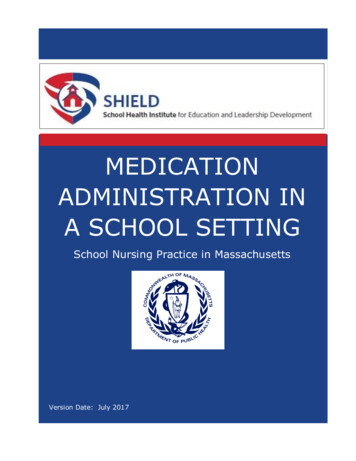
Transcription
MEDICATIONADMINISTRATION INA SCHOOL SETTINGSchool Nursing Practice in MassachusettsVersion Date: July 2017
OverviewSchool Nurses are responsible for providing care for students so they can besuccessful, healthy and safe in school. School Nurses are managers of, and holdfull responsibility for, the school's medication administration program.Students attending school in grades Pre-K through 12 have a wide range ofmedication needs. The complexity of health care for students continues to increasewith new technologies and drugs.This eBook outlines key information every School Nurse needs to know aboutmedication administration including: Regulations and oversight of medication administration and delegation inMassachusetts (MA) The School Nurse’s role and responsibilities A checklist to ensure compliance with Massachusetts Law 105 CMR 210.00 –The Adminstration of Prescription Medications in Public and Private Schools Step-by-step processes required for medication delegation Guidance around individual student situationsThe eBook is part of a training series required for School Nurses and School NurseManagers.Training RequirementsTraining is required for all School Nurses and School Nurse Managersprior to beginning in the role.Retraining is mandatory every five years for School Nurse Managerswho are responsible for a school district’s medication program and arelisted on the Massachusetts Department of Public Health (MDPH)application for registration for delegation of medication administrationin the school setting.The regulations outlined in this eBook apply to both private and public schools.Schools must abide by these regulations during regular school hours, before schooland after school extracurricular events, all off-campus trips (i.e., field trips), andother school-sponsored events.This eBook does not cover additional regulations promulgated by other stateagencies (i.e., DCF, DMH, DDS, DYS, etc.) for their programs.Page 1
Table of ContentsOverview . 1School Nursing Regulations . 4Governance . 5Massachusetts Board of Registration in Nursing (BORN) . 7National Board of Certification of School Nurses & Other Professional NursingPractices . 9Massachusetts Department of Elementary and Secondary Education (ESE) . 9Massachusetts Regulations for Administration of Prescription Medications inSchools . 11Local Government: Boards of Health and Local School Committees. 12Medication Administration . 13Medication Administration Overview . 14Prescription Medication Administration . 17Over-the-Counter and Other Medications . 20Medication Administration Record (MARs). 21Handling and Storage . 24Medication Emergencies . 25Self Administration . 25Delegation of Medication Administration . 28How Do You Delegate in a School Setting? . 29Training Versus Delegation of Nursing Activities . 31Roles and Responsibilities Related to Delegation . 33Tasks that Cannot Be Delegated. 34Five Rights of Delegation. 35Parental Role in the Delegation of Administration of Medication in the SchoolSetting. 45Delegation of Medication Administration Training Programs . 45MDPH Registration Process . 46Application Process . 47Student Situations . 49Field Trips and other School Sponsored Activities . 50Managing Life Threatening Anaphylactic Events in a School Setting . 52Page 2
Management of Diabetes in the School Setting. 56Other Student Situations . 56Conclusion . 58Appendix Items . 59Resources . 60Life Threatening Allergy . 61Articles . 62Medication Administration Implementation Checklist . 63Page 3
School Nursing RegulationsPage 4
GovernanceMedication administration within a school setting is governed by a wide range ofprofessional standards as well as federal, state and local laws and regulations.The Massachusetts Board of Registration in Nursing (BORN) outlines the standardsof conduct for all nurses licensed by the Board. Each nurse licensed by the Boardand engaged in the practice of nursing is responsible for knowing andunderstanding of the Standards of Conduct for Nurses in regulation 244 CMR 9.00and all state laws and regulations governing the practice of nursing. Thesestandards of practice are the same regardless of the environment in which thenurse works.Nurses must have a comprehensive understanding of the relevant regulations pertaining tomedication administration in the school setting and take ownership of the properimplementation of the regulation within the school/district. The requirements outlined inthe BORN Standard of Conduct establish that the School Nurse is responsible for theprogram, policies and execution for the safe administration of medication to students. TheBoard may take disciplinary action against the license of any nurse that does not complywith the Standard of Conduct.Massachusetts regulation 603 CMR 7.00 outlines specific requirements to beeligible to hold the title and assume the associated responsibilities of School Nurse.School Nurses are also encouraged to obtain certification through the NationalBoard Certification of School Nurses (NBCSN). Information on this certification canbe found in the resource section of the Appendix.Medication administration in both public and private school settings is governed byMassachusetts Regulations 105 CMR 210.000. These regulations provide theminimum standards for the safe and proper administration of the prescriptionmedications to students in primary and secondary schools. A school’s or district’smedication administration program should be benchmarked against the standardsoutlined in these regulations. The School Nurse designated as the manager of theprogram is responsible for the regulation being implemented in full.In addition to 105 CMR 210.000, there is a wide range of other state and federallaws that govern medication administration in a school setting includingrequirements from the Department of Elementary and Secondary Education (ESE)and local boards of health.Below you will find a summary of regulation considerations in the administration ofmedication in a school setting.Page 5
Federal Laws and Regulations ConstitutionBill of RightsHealth Insurance Portability andAccountability Act (HIPAA)Family Education Rights andPrivacy Act (FERPA)Individuals with DisabilitiesEducation Act (IDEA)Americans with Disabilities Act(ADA)US Department of Education(DOE)McKinney-Vento ActState Laws and Regulations Administration of Medications inSchool Settings and SelfAdministration (MGL C71 S54B)Controlled Substances Act (MGLChapter 94C)Nurse Practice Act(MGL C112 Section 80B)Tort Claim Act (MGL C258 S2)The Administration ofPrescription Medication in PublicSchools(105 CMR 210.000)Implementation of ControlledSubstances Regulation (105 CMR700)Board of Registration in Nursing(244 CMR 3.00)Registered Nurse and LicensedPractical Nurse (244 CMR 3.05)This eBook provides detailed information about Massachusetts regulations andsupporting public agencies. Additional information regarding these regulations arefound in the resource section of the Appendix.Page 6
Massachusetts Board of Registration in Nursing(BORN)The mission of the Massachusetts Boardof Registration in Nursing is to protectthe health, safety and welfare of thecitizens of the Commonwealth throughthe fair and consistent application of thestatutes and regulations governingnursing practice and nursing education.As part of their charter, BORN is alsoresponsible for investigating complaintsagainst nurses.Massachusetts Regulation 244 CMR 9.00outlines the Standard of Conduct forSchool Nurses.A nurse is responsible for meetingstandards of practice. The regulationstates “a nurse licensed by the Boardshall be responsible and accountable forhis or her nursing judgments, actions,and competency.” Competency meansthe application of knowledge and the useof affective, cognitive, and psychomotorskills required for the role of a nurselicensed by the Board and for thedelivery of safe nursing care inaccordance with accepted standards ofpractice.” In other words, beingunfamiliar or having inadequateknowledge is not a defense for violationof a standard or regulation. A full list ofStandard of Conduct is found in theHealth and Human Services section ofthe Mass.gov website.Standards of Conduct considerationsfor School Nurses: Is nursing care aligned with the standard ofpractice? Is your student health informationsafeguarded? Are your documentation and recordsaccurate, up to date and properlymaintained? Are your policies designed to ensure youare not administering any prescription ornon-prescription drugs unless directed byan authorized prescriber? Is your name, address and social securitynumber listed correctly with BORN? Are you maintaining proper records for thehandling, administration and destruction ofcontrolled substances? Do you always visibly wear an identificationbadge? If you are a Nurse Manager, have youdeveloped and implemented measures topromote and manage the delivery of safenursing care? Do you have a complete understanding ofthe nursing techniques and procedures youare performing? Are you adhering to the standardprecautions and principles of asepsis andinfection control? Are you maintaining proper professionalboundaries with your student?School Nurses are required to know the information needed to perform their jobfunctions. Sources they use to acquire information must be reliable and evidencebased. Nurses must also be physically competent to perform his or her duties.Under the Code of Conduct a nurse licensed by the Board shall not abuse, neglect,mistreat, abandon, or otherwise harm a patient. It is important for a nurse toPage 7
understand BORN’s definition of these terms and how these could relate to theday-to-day environment of working in a school.TermAbuseDefinition Under BORNAbuse means any impermissible or unjustifiable contact or communication with apatient which in any way harms or intimidates, or is likely to harm or intimidate,a patient. Abuse may be verbal or non-verbal, and may cause physical, sexual,mental, or emotional harm.In practice:Abuse is broader in nursing as it includes nonverbal and emotional abuse.Examples of abuse could include an intimidating statement such as “What areyou doing here? Go back to class!” or the use of restraints or seclusion as abehavioral intervention.NeglectNeglect means the unjustified failure to provide treatment or services, or both,necessary to maintain the health or safety, or both, of a patient.In practice:If you have advised a student to take a medication or treatment and they refuse;document and then report this refusal to the prescriber and parent. Failure todocument and report will expose you to liability.MistreatmentMistreatment means the improper use of any drug, physical or chemical restraintor confinement, or any combination thereof.In practice:Restraints are limited to a one-time emergency use in the school setting in orderto prevent harm to the student or others. Continued use of the restraint as abehavioral intervention may be considered mistreatment.AbandonmentAbandon means to intentionally terminate any nurse/patient relationship withoutreasonable notice to the patient or appropriate other person(s), or both, so thatarrangements can be made for necessary continuation of care.In practice:It is not abandonment to leave the school if there are no students withimmediate health or safety concerns that require your nursing services and if youinform another designated, responsible adult in the building you are leaving.However, it could be abandonment if you left the school while there was a childin need of medical attention and you did not provide for care of the student.A nursing license from the state of Massachusetts (MA) is limited to performingnursing duties when physically located in MA. When a School Nurse is responsiblefor students traveling to other states (e.g., field trips) the nurse must understandand abide by the laws and requirements concerning the scope of practice fornursing in that state. State requirements can be determined by contacting thestate’s Board of Nursing. Note that Board of Nursing requirements can change, soit is prudent to regularly reaffirm requirements in other states prior to sendingstudents on field trips.Page 8
National Board of Certification of School Nurses &Other Professional Nursing PracticesNurses working in a school setting are encouraged toobtain certification through the National BoardCertification of School Nurses (NBCSN). Certificationrepresents a national standard of preparation,knowledge, and practice. Both the American Federationof Teachers and National Education Associationrecognize NCSN status as equivalent to NationalTeacher Certification.A full list of requirements to obtain certification is foundon the NBCSN website.Requirements forCertification: License as a RNAcademic transcript (Bachelor’sdegree in nursing or higher)Clinical requirement of 1,000hours worked within threeyearsPass a national certificationexamAs part of the nursing profession, School Nurses should also be familiar withprofessional nursing practices as outlined by national organizations such as: American Nursing Association (ANA) National Association of School Nurses (NASN)The Appendix provides direct links for more information about each of theseorganizations.Massachusetts Department of Elementary andSecondary Education (ESE)The Department of Elementary and Secondary Education (ESE) also has a set oflaws and regulations that affect School Nurse practice. It is important for SchoolNurses and Nurse Managers to know the education laws as well as the laws thataffect nursing practice.Requirements to be a School Nurse in MassachusettsMassachusetts regulations promulgated by the Department of Elementary andSecondary Education (ESE) 603 CMR 7.00 outline the requirements to be a SchoolNurse in the State of Massachusetts. There are two levels of license, an initiallicense and a professional license. The requirements for each are outlined below.Initial LicenseProfessional License1. Valid license to practice as a RegisteredNurse in Massachusetts.1. Possession of an Initial license.2. A bachelor's or master's degree in nursing.Page 92. Three years of employment as a SchoolNurse.
3. A minimum of two full years of employmentas a Registered Nurse in a child health,community health, or other relevant clinicalnursing setting.4. Completion of an orientation program basedon the requirements for delivery of schoolhealth services as defined by theDepartment of Public Health.5. Passing score on the Communication andLiteracy Skills test.3. Completion of one of the following:a. Achievement and maintenance ofcertification or licensure by a nationallyrecognized professional nursingassociation as a School Nurse,community health Nurse, or apediatric/family/School Nursepractitioner.b. A master's degree program that mayinclude credits earned in a master'sdegree program for the initial licensein community health, health education,nursing, or public health.A nurse must be licensed as a Registered Nurse (RN) to perform all duties requiredof a School Nurse. However, a school system may hire Licensed Practical Nurses(LPN) to work alongside the RN in a limited capacity. For example, LPNs arecommonly hired to support a special needs child with multiple health issuesrequiring one-on-one care.Per the Nurse Practice Act, LPNs cannot practice autonomously and independentlyas an RN. Rather, an LPN can only assume limited responsibilities under thedirection of an RN.The below table outlines the differences in job scope and responsibility for eachlevel of licensure.Registered NurseHolds ultimate responsibility for careScope includes: nursing care, healthmaintenance, teaching, counseling, plans andrestoration for optimal functioning & comfortResponsibilities: Complete health assessments andcreate health plans Plan & implement care - prescribedmedical or therapeutic regimes,scientific principles, recent advances ¤t research Provide & coordinate health teaching Evaluate outcomes May delegate the administration ofmedicationPage 10Licensed Practical NurseBears full responsibility for the quality of healthcare she/he providesScope includes: participation in nursing care,health maintenance, teaching, counseling,collaborative planning and rehabilitation, to theextent of his/her educationResponsibilities: Participate in planning & implementinginterventions including recent advances& current knowledge in the field Incorporate medical regimes Participate in health teaching When appropriate, evaluate outcomes,initiate or encourage change in the plan May not delegate the administration ofmedication
A Registered Nurse holds full responsibility for health assessment, medicationplans and delegation of medication administration. An LPN may only provide inputinto the assessment or plans.Additionally, The Massachusetts Regulation Governing the Administration ofPrescription Medications in Public and Private Schools [105 CMR 210.005(I)]requires that the nursing care provided by an LPN be supervised by the SchoolNurse (RN). An LPN may not delegate the administration of medication.Massachusetts Regulations for Administration ofPrescription Medications in SchoolsMassachusetts regulations 105CMR 210.000 provide minimum standards for thesafe and proper administration of prescription medications to students in theCommonwealth’s public and private primary and secondary schools.The aim of 105CMR 210.000 is to ensure that students requiring medication duringthe school day will be able to attend school and have medication administeredduring school hours. The “school day,” as defined for the purpose of 105 CMR210.000 is any day, including a partial day, that students are in custody of theschool, whereby the school has both the duty and the authority to act to protectthe students in their care. School Nurses and Nurse Managers should have an indepth understanding of the requirements outlined in this regulation. A summary ofthe regulations is found later in this eBook.School Nurses hold responsibility for executing each aspect of the regulationcorrectly within their school.105 CMR 210.000School Nurses must follow each requirement included in105 CMR 210.000: THE ADMINISTRATION OF PRESCRIPTIONMEDICATIONSIN PUBLIC AND PRIVATE SCHOOLSEach applicable section of this eBook provides a checklist ofrequirements outlined in the regulation.Page 11
Local Government: Boards of Health and LocalSchool CommitteesThrough ordinance and school committee policies, local government can also effectschool nursing practice.Nurses must be aware of boards of health and other local ordinances governing thecommunities in which they are employed. For example, there may be a localordinance regarding the appropriate temperature for occupancy of the school aswell as the number of bathrooms required in the school.To ensure that any school policies are in compliance with state and federal laws,nurses should work in collaboration with their school committees when policies aregoverning school health services including medication administration or othernursing practices.Page 12
Medication AdministrationPage 13
Medication Administration OverviewMassachusetts regulations 105 CMR 210.000 define medication administration asthe direct application of a prescription medication by inhalation, ingestion, or byany other means to the body of a person. The School Committee or Board ofTrustees, consulting with the local board of health, where applicable, is responsiblefor adopting policies and procedures governing the administration of prescriptionmedications and self administration of prescription medications within the schoolsystem. School Nurses should also play an active role in this process as they areultimately responsible for the development and management of the medicationadministration program in order that these policies comply with state laws andregulations within the school they serve.The options for medication administration in the school setting permitted byregulations are as follows:1. All medication administered by licensed personnel2. Delegation to properly trained, unlicensed school personnel underthe authority of the School Nurse3. Self administration by the student with parental permission and approvalby the School Nurse4. Training of unlicensed school personnel in the administration ofepinephrine via an auto-injector to those with a prescription.Note: Both delegation of medication administration and the training of unlicensedschool personnel in the administration of epinephrine via an auto-injector requireagreement at the school district level by the School Nurse, School Physician,Superintendent (Administrator) and School Committee (Directors) and currentregistration with the Massachusetts Department of Public Health aftercertain conditions are met.It is important to note that the regulations stipulate that the School Nurse, inconsultation with the School Physician, has final decision-making authority withrespect to delegating administration of medications to unlicensed personnel inschool systems registered with the Department of Public Health. The School Nurseis responsible for developing the student’s medication plan and the procedures forthe administration of the medication, including an emergency action plan, ifrequired.Page 14
Medication Administration Plans:The School Nurse is required to develop a medication administration plan for eachstudent receiving a prescription medication. When possible, the plan should bedeveloped collaboratively with parents and students.Medication Administration Plan ChecklistEnsure medication plans include: Student name Order from a licensed prescriber Signed authorization of the parent or guardian Known allergies to food or medications Diagnosis (unless a violation of confidentiality) Possible side effects, adverse reactions or contraindications Quantity of prescription medication to be received by the school from the parent or guardian Required storage conditions Prescription duration A plan for monitoring the effects of the medication Provision for field trips or other short-term eventsIf applicable: Designation of unlicensed school personnel, if any, who will administer the medication to thestudent in the absence of the School Nurse, and plans for back-up if the designated personnelare unavailable Plans for teaching self administration of the medication The location where the administration and storage of the medication will take placeProcedures for Administration of Medicine:In addition to the medication plan, the School Nurse should have accompanyingprocedures outlined for the administration of the medication. Procedures should bealigned with professional nursing practices. Under the regulations, procedures mustinclude: Positive identification of the student (two forms of identification arerecommended, i.e., asking the student his name and a photo in the medicationadministration log)A record-keeping systemA system for documenting observations related to effectiveness or adversereactionsSafe storage, including medications that require refrigerationEmergency response (e.g., what to do inMedication Errors:the case of a reaction). This includesA medication error includes any failure tomaintaining a list of persons, with theiradminister medication as prescribed for aphone numbers, to be contacted asparticular student, including failure toappropriate, in addition to theadminister the medication:parent/guardian, School Nurse, licensed Within appropriate time framesprescriber and other persons designated In the correct dosage In accordance with acceptedin the medication administration plan.Page 15 practiceTo the correct student.
Procedures for receiving medicationorders, documenting medicationadministration and reporting medicationerrors are in place.The Poison Control Center (1-800-222-1222) should be contacted for any concernabout a student inadvertently receiving the wrong medication or the wrong dose.They are available to respond and guide you around what emergency actions musttake place. When calling the poison control center, be sure to have the medicationin hand. You may be asked to read information from the bottle’s label. You willalso be asked to give: Your zip code The student’s age and weight Any symptoms the student has related to the medication mistake The time the medication was taken The name of the medication The amount of the medication Any current health problems of the student Any other medicines the student is takingWith all medication errors (including a missed dose), transparency and immediateaction are essential. Be sure to notify the parent or guardian immediately of theerror and report and document the error as defined in your medication procedures.Additionally, if the error may cause possible harm to the student, report the errorto: The student’s primary care provider and/ or prescriber MDPH School Health Unit by completing and submitting the required formMost districts will also have policies in place that should be followed and are likelyto require a district accident/accident form is completed. Additionally, the MDPHDrug Control program as well as the local police should always be notified if there isa diversion or drug loss.Real Case Examples of Medication ErrorsExample 1:A kindergartner was taken to the hospital on the first day of school. Ateacher's aide accidentally gave him another child's medicine. The 5year old boy became drowsy after he was given Catapres (clonidine),Page 16
a blood pressure medicine sometimes used to treat children who haveattention deficit hyperactivity disorder (ADHD).Example 2:An eighth-grade student with ADHD was suddenly not responding tohis methylphenidate (Ritalin). He began to develop new symptomsand ended up in the emergency department, unconscious. The SchoolNurse had not been available during the prior week. In her absence,the school secretary was giving children their medicine. For 3 days,the secretary accidentally gave the eighth-grade student anotherstudent's methadone, a powerful narcotic pain medicine with seriousside effects. The medicines had been kept in envelopes with only thegeneric names, methylphenidate and methadone, handwritten on theoutside, not the name of the student. Since both medicines start withm-e-th and are taken in similar doses, the medicine was easilyconfused by the school secretary.Example 3:A school office secretary did not require a child to wash his handsbefore diabetes testing. This resulted in an abnormally high bloodsugar level because the child had jelly on the finger that was used totest the blood. The child received too much insulin and experiencedsigns of a very low blood sugar.Prescription Medication AdministrationRegulations under 105 CMR210.000 outline a list ofrequirements for all prescriptionmedication administration.Prescription medication may notbe administered without aproper, current medication orderfrom a licensed prescriber. Allorders must be in written format.A telephone order from aprescriber may be accepted iffollowed by a written order withinthree school days. Whenpossible, it is a best practice forSchool Nurses to obtain physicianorders and create medicationadministration plans prior to thestart of the academic year.Page 17Prescription OrdersEnsure the following is included in all orders fromprescribers: Student’s name Name and signature of the licensed prescriber andbusiness and emergency phone nu
This eBook outlines key information every School Nurse needs to know about medication administration including: Regulations and oversight of medication administration and delegation in Massachusetts (MA) The School Nurse's role and responsibilities A checklist to ensure compliance with Massachusetts Law 105 CMR 210.00 -
